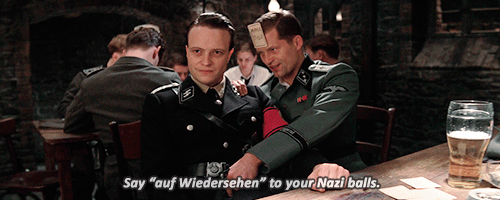Of all of the things that the left and right fight about, perhaps the most illuminating is the great apes. The fight is simple: Human's closest living biological relatives are the two species of the pan genus, the chimpanzee and the bonobo. Of the two, the chimpanzee, pan troglodytes, is the favorite of the right. Chimpanzees live in hierarchical communities, with clear leaders and subordinates. They engage in violent warfare with other communities, and they do not share their food with strangers. They are the "might makes right" ape.
Bonobos, pan paniscus, are the favorite of the left. Bonobos are not warlike -- disputes are solved by fucking. Like, seriously, the life of a bonobo is just a long orgiastic fuckfest. They fuck to say hello, they fuck to strengthen social bonds, they fuck to end fights, and they fuck for fun. They fuck bonobos of the same sex, as well. Female bonobos unite with each other against male sexual aggression, preferring male bonobos who are respectful towards them. They are the "make love, not war," feminist, communist ape.
This is, of course, a simplification: aggression has been seen in bonobos, they do have social hierarchies, and prosocial and promiscuous sexual behavior has been seen in chimps. The fight illuminates less about bonobos and chimps, and more about what the right and left believe about human nature. The left argues that we are more like bonobos, the right argues we are more like chimps. In reality they are both cousins, equally distant from us on the evolutionary family tree.
But in the past, the right has been more successful than the left in promoting the biological justification of their political views. It's still the version of biology that is taught to us in school: survival of the fittest. The thing that drives evolution in this interpretation is competition. The better competitors survive, while the weaker competitors die. It's brutal, but it makes for stronger, more resilient species, and as such, should be accepted as a good thing. Attempts to lift up the weak at the expense of the strong, in this version of reality, is actually weakening the species as a whole, and is morally reprehensible. Let the strong survive. Let the weak die.
This Social Darwinist way of thinking was the basis of the eugenics movement and also of Nazism. It's attempts to provide a scientific justification for racism were wildly influential in the early 20th century, and have hardly been rooted out after the defeat of fascism in the 40s. It's maybe stated a bit less explicitly, but still, at the root of right-wing thought is the idea that competition is good, and to artificially make the weak stronger is to hamper the course of nature.
Cooperation vs. Competition
In the latter half of the twentieth century, the left managed to beat back the advance of eugenics, thanks to the defeat of Nazism, the rise of the civil rights movement, and the scientific debunking of racist ideas, but it failed to adequately counter the "survival of the fittest" narrative in biological science, which effectively left the door open for the fascists, once they got their shit back together. "They can force their PC agenda on us all they want," a right-winger could argue, "it doesn't change the laws of nature."
There are a few reasons that the "survival of the fittest" narrative didn't die with the Nazis: first, a lot of the people who defeated the Nazis were capitalists, not leftists. Competition is the entire basis of capitalism, so liberals and moderate conservatives basically agree with the far right on this scientific point: the cream should rise to the top. The failure of the weak isn't an entirely bad thing. Inequality is good because it stimulates competition.
The other people who defeated the Nazis were creatures of the left, but they were usually authoritarian communists. They did not want to acknowledge that the best argument against right wing Darwinism came from another corner of the left -- came, in fact, from one of their greatest foes: the anarchists.
The specific anarchist in question was Pyotr Kropotkin. Kropotkin, in the earlier part of his life, was better known as a biologist than he was as an advocate of anarcho-communism, though his greatest contribution to both fields was likely the same book: Mutual Aid: A Factor of Evolution.
Kropotkin's argument is widely acknowledged by biologists and anthropologists today, and that is that cooperation holds at least as much of a claim on being the core driver of evolution as competition. Animals regularly cooperate with members of their own species to survive as a group rather than as individuals: ants will lay down their lives to protect their colonies, migrating geese take turns at the head of the flying V so other geese can draft and save energy, elephant herds will protect the young and old as a unit. The individualist ideal of the "lone wolf" is in fact, quite illustrative. A lone wolf is actually a distressed creature, as wolves live in packs and are incredibly cooperative within that context -- a lone wolf's main goal would generally be to no longer be alone.
For humans, cooperation has been at least as much of a part of who we are as competition has since the beginning of time. We've always been social animals, and while we often fight with one another, the majority of our time is spent not in battle, but among our tribe, working for a common good. Every time you send someone who's having a hard day flowers or a plate of cookies, every time you lend someone your pencil or give a stranger a seat on the bus, you're sacrificing your well-being for someone else's. I would argue you probably help people more often than you destroy people, that being kind and decent is so reflexive than you do it instinctively, whereas competition and destruction requires planning, and thus, takes up more of your attention than just being decent.
Cooperation within species (called "altruism" by biologists) is extremely common, but so is mutualism, which is cooperation across species. The most obvious example of this is probably in pollination, where a pollinator like a bee or a butterfly feeds off of the nectar of a plant, and then pollinates another plant, allowing the pollinator to survive and the plant to pass on its genes. But humans do it too -- you have a mutualist relationship with your gut bacteria, which allows you to digest food and gives the bacteria a place to live. More obviously, you have a mutualist relationship with your dog, which protects and supports you in exchange for your food and love (a cat's relationship with a human might be better described as parasitic, to be honest. You know, depending on the cat).
Kropotkin didn't deny the existence of competition, which obviously played a huge role in evolution. This is why he called mutual aid a factor of evolution rather than the factor. His point was that cooperation was underemphasized, and that there was as much of a scientific basis for working together as there was for defeating the competition.
Mutual aid is widely recognized by naturalists and anthropologists as being a fact of life, but it has not been adopted as widely as a political ideal because, as we mentioned, capitalists don't like to admit that cooperation is important. The left has also been slower to glom onto the idea than it should, and this is mostly because in the 20th century, it was the Marxists, not the anarchists, who won the major battles.
Marxists generally believe in cooperation between the workers being the highest ideal, but they believe that this cooperation will be brought about through a revolution that overthrows the capitalist state. The revolution, of course, will be led by them, the Marxist vanguard, and they will guide the common people on how to reach a state of cooperative communism.
It's harder to argue for the necessity of a vanguard (or even a revolution) when cooperation is an inherent trait of being human. If cooperation is a muscle we all have, then all it needs is a little bit of flexing to get back into practice. If enough people started working together and not against each other, then you'd have a cooperative society. This is what Gandhi, who sometimes declared himself an anarchist, meant by "be the change you wish to see in the world." The revolution is not out there, it is inside you.
Grassroots Morality
Frans de Waal is a naturalist who has spent most of his life studying bonobos and chimpanzees, and in his 2013 book The Bonobo and the Atheist, he argued against the prevailing atheist thought, which was that morality, though not passed down from God or some divine being, was nonetheless something that came from the top-down. We are moral creatures, the New Atheists argue, because we can think and reason, and our reason leads us to making moral choices.
de Waal's argument was that simply looking at primate behaviors proved that this was not the case -- empathy and cooperation were reflexive traits in our closest relatives, and that behavior we would consider "moral" could be spotted throughout the animal world. What's more, when we behave in this way, it does not light up the "reasoning" part of our brain in a CAT scan.
If you, like me, have long heard from believers that by not believing in god, there's "nothing stopping you from committing murder," you know that the top-down approach to morality is nonsense. It shouldn't be a surprise, then, to learn that higher thought is also not the reason we make moral choices. Religious people and smart people often behave like absolute dogshit.
Trying to make broad deductions about what human nature is ultimately pointless -- humans appear to have both competition and cooperation bred into their genes, and moral behavior as well as immoral behavior is present throughout the animal kingdom. If either one is an option, if either one is your birthright, then it's a choice, isn't it?
Which one do you value more: power, strength, and competition?
Or compassion, empathy, and cooperation?
How you choose is how you will behave, how you behave will shape your society.


![Graeber’s Bullshit Jobs. [Affiliate link]](https://images.squarespace-cdn.com/content/v1/5900e73dd2b85756c5b7877a/1571846335028-6X17N0AHTORVG8RT9CY9/bsjobs.jpg)










